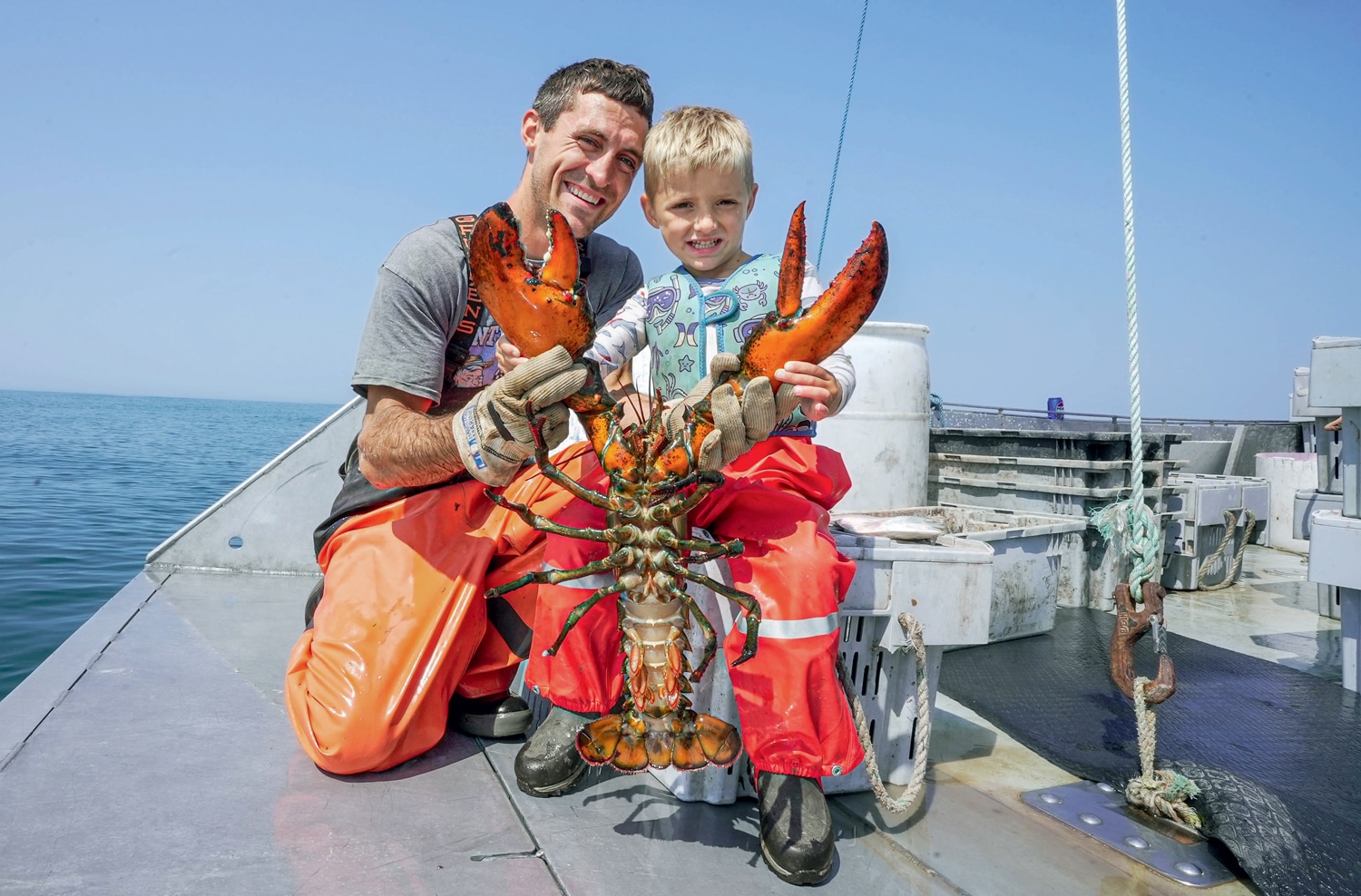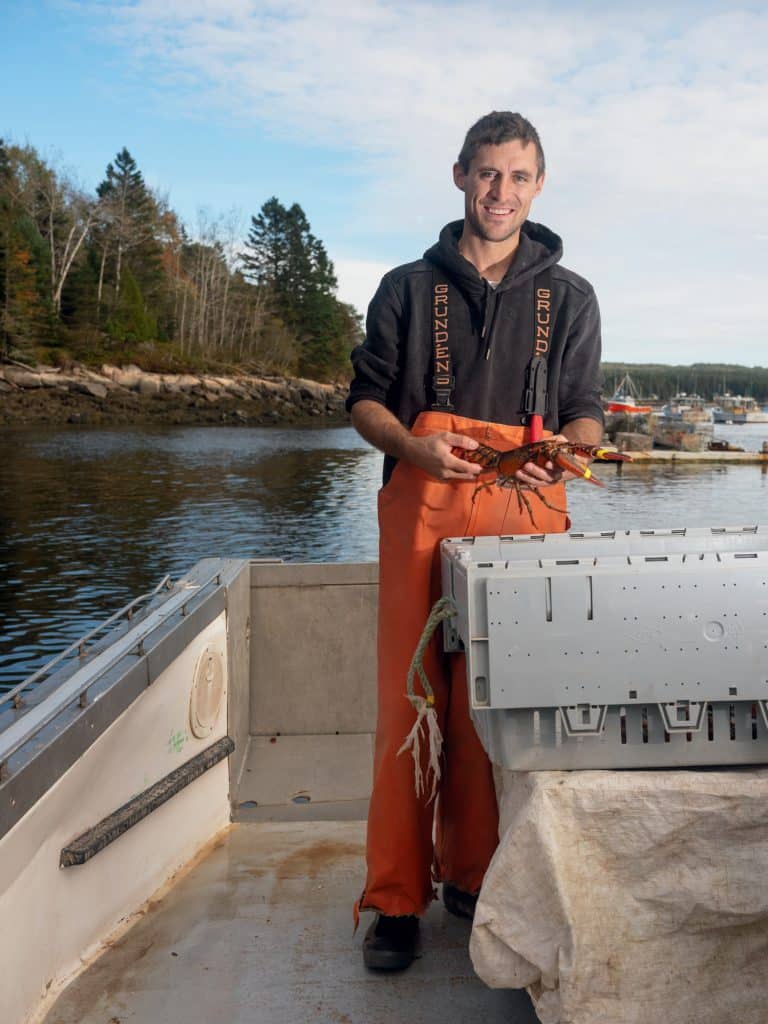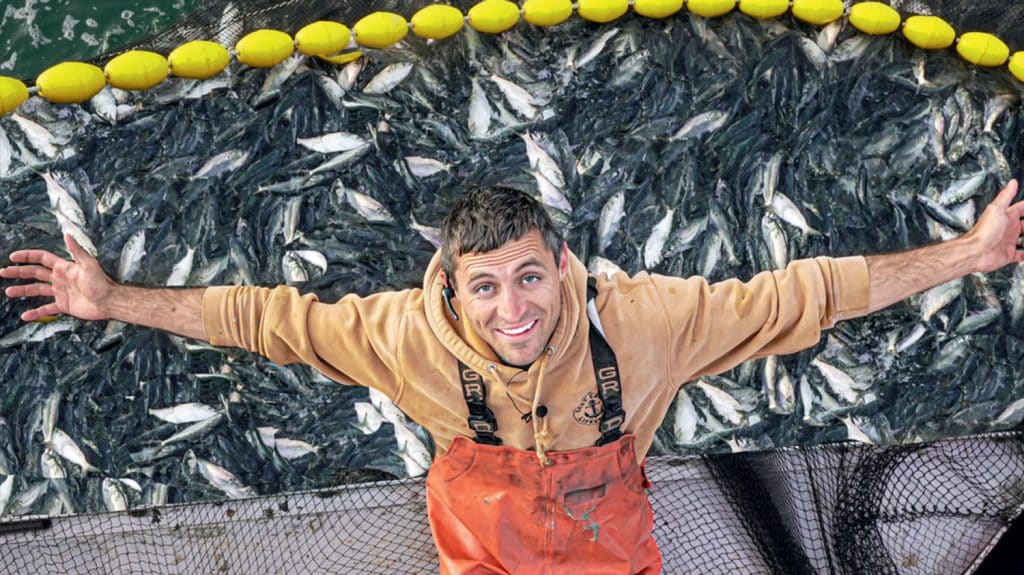Q&A With Jacob Knowles, the Charismatic Maine Lobsterman Making Waves on TikTok
In sharing his day-to-day life on the ocean, Maine lobsterman turned TikTok star Jacob Knowles is pulling in followers by the boatload.

Knowles with his son Jayce and a nearly century-old lobster, which they released after giving it a fish snack for the road.
Photo Credit : Jeremy T. Grant/Knowles MediaBy Alyssa Giacobbe
Thirty-one-year-old Jacob Knowles is a fifth-generation lobsterman in Winter Harbor, Maine, population 475. He got his start in the business before he was even in double digits, working crew on his dad’s boat; by the time he was 15, he was operating his own boat, setting and hauling traps before school, after school, on weekends, and all summer long. When his waders were shed, he turned to YouTube for a glimpse of how other kids his age—beyond the 20 or so in his graduating class—lived. It was a chance to see the world without leaving his own.
Knowles was a teenager when he began creating his own videos for YouTube, mostly of his recreational pursuits: hunting, fly fishing, skiing, hiking. But nothing really happened (was anyone out there?) until Knowles took to TikTok—and, specifically, until he turned his attention to the one thing that was so day-to-day familiar it hadn’t even occurred to him that others might find it interesting, let alone wildly compelling: the life of a lobsterman.
Today Knowles has nearly 6 million followers across multiple social media platforms, plus a videographer, several corporate partnerships, and even a talent agent. His videos are energetic and entertaining, but they’re also educational without being pedantic, not even a little. “Everybody’s always asking what the biggest lobster I’ve caught is,” he says in one video posted to TikTok showing him aboard his boat, the Rest-Ashoar, in his bright orange waders holding up a massive lobster, which he places next to a can of Red Bull for reference. (“And that’s the big Red Bull, too. That’s not the little 8.4 [ounce].”) Knowles estimates that the lobster is well over 10 pounds and probably pushing 100 years old. “Pretty crazy,” he says, “to think that my grandfather, great-grandfather—most likely my father—have caught this lobster [too].”

Photo Credit : Kate Greene
Other videos offer tutorials on such topics as egg-bearing female lobsters—aka “eggers”—and how they are given a notch on their tail so that other fishermen will know to release them. Lobsters pulled up with lots of barnacles on their shells get a trip to what Knowles calls “Claw Spa”: He cleans each up with pliers, places a fish “snack” into the pincher claw, and tosses the lobster back into the ocean. Other creatures also make appearances, including monkfish (“probably the world’s ugliest fish”), the occasional tiny seahorse, and any number of small birds that get blown out into the Atlantic during high winds and come to rest, exhausted, on the boat, where they spend the day being fed snacks and drinking water from bottle caps until they get ferried back to shore. (One of Knowles’s earliest bird posts generated more than 10 million views. )
We caught up with Knowles by phone in late summer, on a rare day off from the Rest-Ashoar he’d given himself in order to take his wife and three kids to the Portland Sea Dogs baseball game, where he’d been invited to throw out the first pitch.
Q: So, what does a lobsterman know about becoming a TikTok influencer?
A: I’d been experimenting with YouTube since I was a kid, maybe 14 or so. I never really stopped. My senior year of high school I started watching YouTube a lot. I’d watch fishing content but really just loved watching anybody outside of the small world I grew up in. The more I watched, the more I was like, I want to try this.
I’m in a unique spot in Maine. I see things that a lot of other people may never see. I wasn’t sure if my niche was on the ocean or on land, but I thought that I had something, a unique looking glass. And I’ve always been good at explaining—anything that I understand is easy for me to explain to other people.
Early on, I tried taking cameras out on the lobster boat to film for YouTube, but you know, it was challenging. When you’re running the boat, you sort of need to be running the boat. So I’d show my life in Maine, doing things I did for fun. I was doing those things anyway, and I enjoyed making videos. If I was doing it for the views, I would have quit.
Then, during Covid, TikTok really took off. All of a sudden, it was possible to just haul a phone out and take a 6-second, 10-second, 30-second video and post it. That was a lot easier to manage. That really revolutionized how I, and lots of other people, created content. Now all of a sudden, farmers, truck drivers, lobster guys—anybody, really—could do this. You didn’t need to know how to film and put together a video to be a content creator anymore.
Q: Lobster licenses are hard to come by, at least in Maine. Did you ever feel pressured to go into lobstering simply because you could?
A: My father was a lobsterman, as was his father and his father. Licenses can’t be passed down, but it’s easier to get one if you’re born into a fishing family, because you start at a young age. To get a license, you have to log hours on another boat. After you get your hours done, you sit on the waiting list until a certain amount of fishermen leave your zone. There’s an enter-exit ratio in place—I believe ours is three-to-one or two-to-one, somewhere around there—so a couple fishermen have to leave before one can come off the waiting list. That’s why starting as a kid is important if you’re going to stand a chance of getting a license by the time you want to do it full-time.
I could have gone the college route. But I’d already worked my way up in fishing, and was fishing full-time pretty much through high school. My summer vacations were spent lobster fishing. So by senior year, when I had enough credits to only have to go to school every other day, I was ready to make a real go of it. It just made more sense to me at that time to continue pursuing lobster fishing. And I did enjoy it.

Photo Credit : Jeremy T. Grant/Knowles Media
Q: The New York Times has called you “TikTok’s finest lobsterman.” What do the other lobstermen Down East think about that?
A: I was nervous about what they would think of this whole thing. But I’ve always tried to make all my content something that other fishermen could respect and appreciate—informative, educational, and cool. I don’t want to ever do something that is frowned upon by my fellow fishermen. Everything on the ocean, the world that I have grown up in—and still live in—is based on respect for each other…. It’s very old-fashioned. So I’ve always tried to make sure the content is something that is good for the industry. And for the most part, but especially in my harbor, all the fishermen have appreciated that.
My dad is still fishing. I feel him out a little bit. Social media is all very foreign to him. But he’s a good example of who I try to make content for.
Q: What’s been the most surprising part of this turn in your career?
A: That there’s so much fan engagement. That people care. I spent three years basically just answering questions that popped up in the comments. Maine lobster is popular worldwide, but nobody really knew much about it other than it tasted good.
Personally, it’s made the longer days more interesting. The lobster fishery is open year-round but we slow down a lot in the winter. There’s a lot of monotonous, boring times where when we’re not catching much. We’re confined to a small zone on the coast, so we can’t really go chase after lobsters in other areas. We’re just sitting waiting for the lobsters to come to us. If you compare it to a sport, we’re never really on offense. And now, instead of grinding through those boring times, it’s fun all year long.
Q: People learn a lot from watching your videos—for instance, I never knew you could put a lobster to sleep by petting it. Have you learned anything from making them?
A: Petting a lobster—I knew that one from my dad. That was an old trick passed down through the generations. I don’t know who first figured that out or how, but it’s always a funny one. People love it.
It’s been interesting trying to figure out what will be popular and what won’t. I’ve learned how to structure a video so that people don’t lose interest too early. I’ve learned a lot about “the algorithm” from other creators, people who are actual content creators. Those guys have, like, very creative brains. I don’t even know if I really consider myself a content creator. I’m more or less just sharing my life.
Jacob Knowles is on TikTok @jacob_knowles. For links to his other social media accounts and more, go to pillar.io/jacobknowles.


